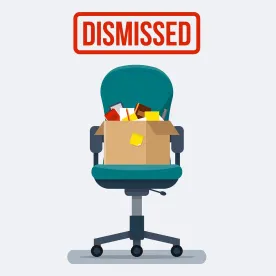The New Jersey Senate has passed a bill that would amend the New Jersey Millville Dallas Airmotive Plant Loss Job Notification Act, more commonly referred to as the “NJ WARN Act,” to require severance payments and increase notification requirements for employees impacted by certain mass layoffs, transfers or terminations of operations.
Currently under the NJ WARN Act, employers with 100 or more full-time employees must provide 60 days’ notice to affected full-time employees in the event of a mass layoff or transfer or termination of operations. A mass layoff is defined as a reduction in force, during a 30-day period, that results in the termination of 500 or more full-time employees or the termination of 50 or more full-time employees representing at least one-third of an employer’s total workforce. Under the current law, employers are only required to make severance payments to affected employees if they fail to provide such employees with the required amount of notice of termination or layoff.
The pending bill, if enacted, would:
-
revise the definition of a “mass layoff” to mean a reduction in force, during a 30-day period, that results in the termination of 50 or more employees, regardless of full-time or part-time classification, at or reporting to an “establishment” (as defined in the bill);
-
require employers with 100 or more employees (regardless of full-time or part-time status) to provide at least 90 days’ notice to impacted employees before a mass layoff, transfer of operations to another location, or shutdown of an establishment;
-
require employers to pay severance of one week’s wages for every year of an impacted employee’s service in the event of a mass layoff or shutdown/transfer resulting in the termination of 50 or more employees in an establishment during any 30-day period, regardless of whether or not appropriate notice is provided to affected employees;
-
require employers who fail to satisfy the 90-day notice requirement to pay an additional four weeks of severance to affected employees; and
-
expand the definition of “establishment” to include either a single location or a group of all of an employer’s locations in New Jersey (currently, the NJ WARN Act defines an establishment as a single location or a group of contiguous locations which form an office or industrial park, or separate buildings across the street from each other).
Covered employees subject to a collective bargaining agreement or other severance plan or policy would be eligible for the statutory severance described above or any severance pay provided pursuant to the CBA or severance plan/policy, whichever is greater. Employees would not be permitted to waive the statutory right to severance except with the approval of a court or the Commissioner of Labor and Workforce Development.
In another notable change, the bill would broadly define an employer to include “any individual, partnership, association, corporation, or any person or group of persons acting directly or indirectly in the interest of an employer in relation to an employee, and includes any person who, directly or indirectly, owns and operates the nominal employer, or owns a corporate subsidiary that, directly or indirectly, owns and operates the nominal employer or makes the decision responsible for the employment action that gives rise to a mass layoff subject to notification.” Accordingly, the law, if enacted, would impose liability on individuals acting in the interest of an employer, including individuals who own the employing entity or are responsible for the decision to effectuate the layoff.
The bill passed the state Senate with a vote of 27-13 on December 16, 2019 and a nearly identical bill awaits a state Assembly floor vote. We will continue to monitor and report on further developments regarding this bill.





 />i
/>i
